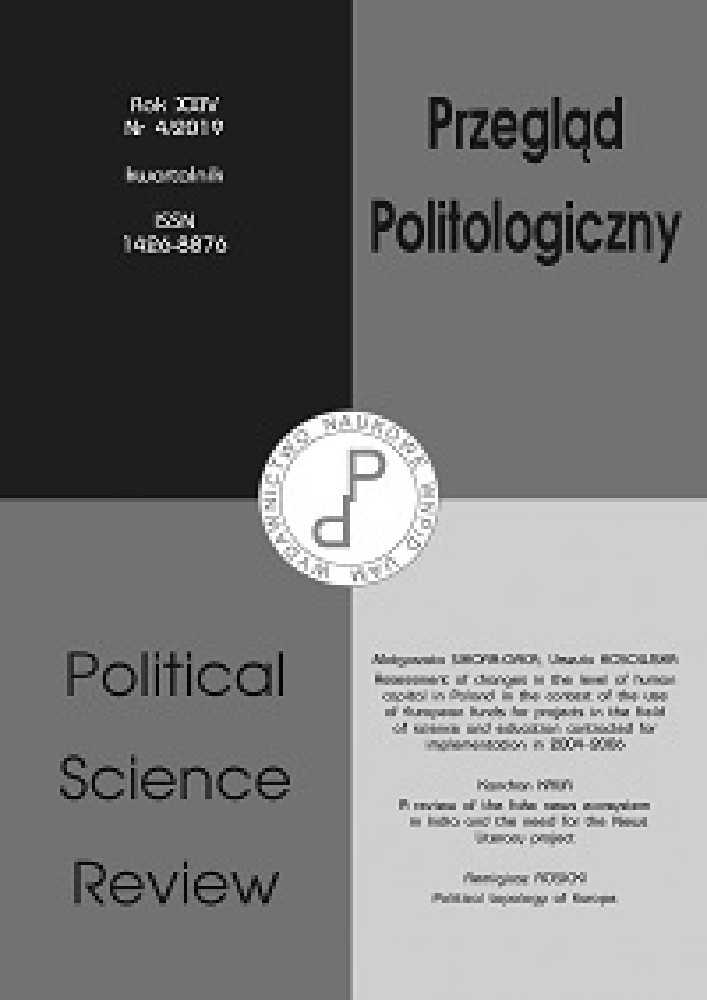Abstrakt
Współczesne kampanie polityczne muszą sprawnie operować zarówno tradycyjnymi środkami przekazu, jak i nowymi mediami, by ich kandydat mógł wygrać. Rozwój social mediów pozwala nawiązać relację z wyborcą, poprzez możliwość udostępniania oraz interakcji kontentu udostępnianego przez kandydata. W dzisiejszych czasach, z pomocą internetu, kandydat może poświęcić mniejszą ilość pieniędzy oraz czasu na kampanię, jednocześnie mając dostęp do szerszej bazy potencjalnych wyborców. Warto jednak pamiętać, że internet jest nowym wynalazkiem, a na początku XXI wieku jedynie odrobinę ponad 50% Amerykanów miało do niego codzienny dostęp. Celem artykułu jest sprawdzenie w jaki sposób kandydaci w wyborach prezydenckich w Stanach Zjednoczonych próbowali zachęcić wyborców do swojej kandydatury poprzez użycie internetu; co więcej, artykuł zadaje pytanie jaki typ wyborcy korzystał z internetu w XX wieku oraz jakiego typu kandydaci mieli największe szanse na zdobycie ich poparcia.
Bibliografia
Belton J., Prodigy makes a foray into politics; database to offer users information on local, national races, “The Washington Post”, 17.02.1992, https://www.washingtonpost.com/archive/business/1992/02/17/prodigy-makes-a-foray-into-politics/9b9c9fb7-2271-45eb-88df-239245ac8278/?utm_term=.88493c61ae0b, 12.12.2017.
Bimber B., Davis R. (2003), Campaigning Online: The Internet in U.S. Elections, Oxford University Press.
Buie J. Internet Innovations in 2000 Presidential Campaign, “250 Years of Politics”, 28.12.2000, https://pcppe.wordpress.com/2000/12/28/internet-innovations-in-2000-presidential-campaign/, 16.06.2017.
Campaign ‘96 Gets Lower Grades from Voters, “Pew Research Center”, 15.11.1996, http://www.people-press.org/1996/11/15/campaign-96-gets-lower-grades-from-voters/, 07.08.2017.
Chadwick A., Howard P. (2010), Routledge Handbook of Internet Politics, Taylor & Francis.
E-Gov: Best Practices, Eagleton Institute of Politics, 04.05.2016, http://www.eagleton.rutgers.edu/programs/egov/bp_politics.php, 23.11.2017.
Fuchs Ch. (2012), Internet and Surveillance: The Challenges of Web 2.0 and Social Media, Routledge, New York.
Gulati G., Williams C. (2007), Social Networks in Political Campaigns: Facebook and the 2006 Midterm Elections, Bentley College Department of International Studies, Waltham.
Hendricks J., Kaid L. (2014), Techno Politics in Presidential Campaigning: New Voices, New Technologies, and New Voters, Routledge.
Johnson T. J., Braima M., Sothirajah J. (1999), Doing the Traditional Media Sidestep: Comparing the Effects of the Internet and Other Nontraditional Media with Traditional Media in the 1996 Presidential Campaign, „Journalism & Mass Communication Quarterly”, vol. 76, issue 1.
Kaid L. (2004), Handbook of Political Communication Research, Routledge.
Katz J., Rice R. (2002), Social Consequences of Internet Use: Access, Involvement, and Interaction, MIT Press.
Klotz R. (2004), The Politics of Internet Communication, Rowman & Littlefield.
Leuschner K. (2012), The Use of the Internet and Social Media in U.S. Presidential Campaigns: 1992–2012, James Madison University.
Lewicki D., Ziaukas T. (2000), The Digital Tea Leaves of Election 2000: The Internet and the Future of Presidential Politics, First Mind.
Logan R. (2010), Understanding New Media: Extending Marshall McLuhan, Peter Lang.
Mc Cracken H., 1992. The year presidential campaigning went online, “Fastcompany”, 11.03.2016, https://www.fastcompany.com/3065162/1992-the-year-presidential-campaigning-went-online, 29.10.2017.
Natta Jr. D., THE 2000 CAMPAIGN: THE MONEY GAME; McCain Gets Big Payoff On Web Site, “The New York Times”, 04.02.2000, http://www.nytimes.com/2000/02/04/us/the-2000-campaign-the-money-game-mccain-gets-big-payoff-on-web-site.html, 17.08.2017.
Saxer U. (1980), Die Massenmedien im Leben der Kinder und Jugendlichen: eine Studie zur Mediensozialisation im Spannungsfeld von Familie, Schule und Kameraden, Klett und Balmer.
Smith E., The Surprising Impact the 1992 Presidential Election Had on the Modern Internet, “Motherboard VICE”, 19.10.2016, https://motherboard.vice.com/en_us/article/qkjx85/the-surprising-impact-the-1992-presidential-election-had-on-the-modern-internet, 11.11.2017.
Stromer-Galley J., This Is What Campaign Websites Looked Like in 1996, “Politico”, 20.03.2014, https://www.politico.com/magazine/story/2014/03/campaign-websites-1996-104827, 10.09.2017.
Thompson N., The Internet and Political Campaigns, “The Globalist”, 16.06.2003, https://www.theglobalist.com/the-internet-and-political-campaigns/, 15.10.2017.
Tomaszewski N. (2017), The impact of Internet 2.0 on behaviour of the voters in the United States – the analysis of 2016 presidential primaries, “Annales UMCS Sectio K”, vol. 24, no. 1.
Wiggins R., Al Gore and the Creation of the Internet, “First Mind”, 02.10.2000, http://firstmonday.org/ojs/index.php/fm/article/view/799/708, 14.12.2017.

